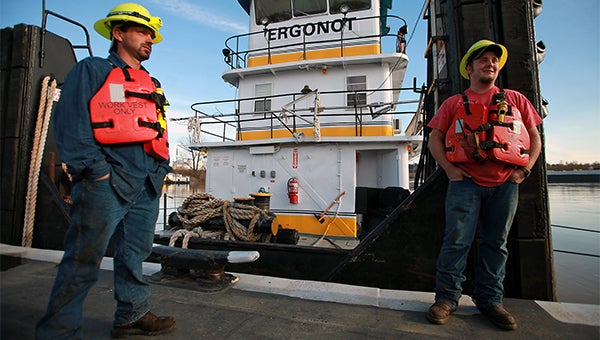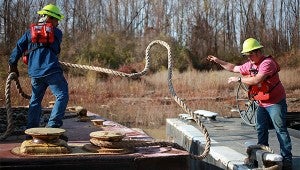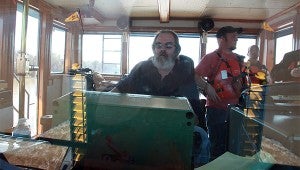Taking care of the boat: Deckhand makes living towing goods up and down the river
Published 12:14 am Friday, February 27, 2015

John Cochran and his partner relax a moment while the Ergonot waits for a call to move a string of barges. “Doing tow work pays the bills, and you get to meet somebody new every day, John said. “You never know what you’re going to do that day.”
The Ergonot slid over the glassy water like it was skating on ice. /// John Cochran, an orange life jacket draped over him, looked out from the bow of the boat at the vast expanse of Mississippi River with a reverence usually reserved for Wednesday night church.
His work boots, splattered with the mud and muck from hundreds of 10-hour days on the river, keep him upright on this calm and slightly windy day.
“If you don’t have good balance, this job will help you out a lot,” he says with a twang. “My balance now is impeccable.”
Cochran is a tankerman deckhand for Ergon, and he’s moved from the outside of the boat into the smoky captain’s room that feels more like a cigar shop than the spot where the ship is navigated. The crew is just waiting on a call at the moment, so for right now Cochran and his partner are just waiting things out on the 62-year old boat they work five days a week on.
 “If you don’t like it out here, you won’t last long,” he says as pulls out a can of dip and takes a pinch. “But if you take care of the boat, it will take care of you.”
“If you don’t like it out here, you won’t last long,” he says as pulls out a can of dip and takes a pinch. “But if you take care of the boat, it will take care of you.”
Whenever Cochran isn’t hauling barges, he’s cleaning every nook and cranny of the boat — from the kitchen the crew shares to the engine room.
After 20 minutes of cruising, the boat finally gets a call.
A barge needs to be picked up and moved to another location, and Cochran readies himself for the task at hand. The boat skims along at a slow pace before leveling off near a barge longer than a football field that sits seven feet deep in the water. In it is around 1,500 barrels of diesel, or about $1.5 million dollars.
“The value of the product fascinates me,” he says. “It’s amazing how much money we deal with on a daily basis.”
Cochran and his fellow deckhand unfurl long cables and tether them around the tipperheads of the barge. The boat starts to loudly clank and clunk like a bad Dubstep concert as it prepares to latch onto the barge. Cochran takes a C-bar and hammers away at the cable until it sets just right and the noises slowly die down. The barge is lined up and the boat whisks it away at a pace slightly slower than a snail’s jog, and when it finally reaches its destination, Cochran and his partner go through the motions of securing it in its new home along the river.
 Beads of sweat drop from Cochran’s face as he wipes his hands on his jeans and looks up at the sky.
Beads of sweat drop from Cochran’s face as he wipes his hands on his jeans and looks up at the sky.
“I use this as a motivation for my kids. It’s hard because I spend a lot of time away from them, but I tell them they need to make good grades or they’ll be doing what daddy does,” he said. “But doing tow work pays the bills, and you get to meet somebody new every day. You never know what you’re going to do that day.”
The sun is slowly beginning its descent among the trees that dot each side of the river, and the water glistens like it’s wrapped in fine crystal. As the boat makes its gradual chug toward the port, Cochran smiles and looks up at the sky.
Another day is done.





